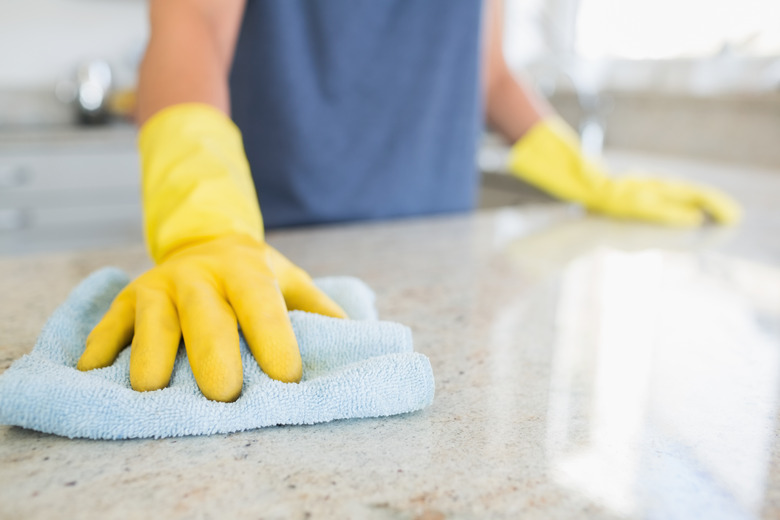How To Clean Stone Countertops
Natural stone countertops are fairly easy to maintain, and performing a basic cleaning doesn't require a lot of specialized products. If the stone gets stained, it may be possible to treat it, but not all stains will come out. Avoid using harsh chemicals or extremely abrasive cleaning tools on these materials because they can cause permanent damage. With regular cleaning and some simple care tips, your stone countertops can last a lifetime.
Cleaning Natural Stone Counters
Natural stone countertops such as granite, soapstone and marble benefit from being cleaned regularly; ideally, after each use. Day-to-day maintenance is not super involved and consists primarily of wiping the surface with a soft towel, mild dish soap and warm water, rinsing the soap off completely and then wiping the counter with a dry, soft microfiber cloth. This removes crumbs and other buildup and mops up any liquids before they have the chance to penetrate the surface of the stone. You'll want to make sure you rinse well so you don't leave a buildup of soap on the surface.
If you prefer, you can also purchase a cleaner that is made specifically for natural stone, although it is smart to check the label and make sure it's compatible with your specific material. Simply follow the directions on the container. You'll also want to be sure to wipe up excess water around the faucet to help prevent calcium buildup if you live in an area with hard water. If any water dots or rings do appear, you can very gently buff them out with dry 0000 steel wool.
Stone Counter Stain-Removal Basics
Although many people think natural stone countertops won't stain, they can absorb liquid and discolor. This is especially true with porous stone, such as some types of light-colored granite. Most types of marble are prone to staining regardless of color, as they are relatively absorbent. Liquids such as red wine are known to stain many types of stone, but some stones may discolor when exposed to coffee, oils and other substances. Out of all the popular natural stone countertop materials, soapstone is the least likely to stain.
If you find that your natural stone counter has been stained, the Marble Institute of America recommends trying a simple fix before turning to more-complex techniques. First of all, blot (don't rub) the spill up as much as possible with a clean paper towel or cloth. Next, use a mild soap and warm-water mix to flush the stain and rinse multiple times to get as much out as possible. Last, use a soft cloth to dry the area. Repeat as many times as needed to clear the stain. This method is safe for all types of stones and stains, but if it doesn't do the trick, you may need to try another method.
Advanced Stain Removal for Stone Countertops
The Natural Stone Institute recommends treating each stain according to its makeup using a cleaning agent or chemical that will address the specific issue caused by the substance that made the stain.
A good way to do this is to apply a poultice to the affected area. Think of a poultice as a kind of "spread" that you put over the stain that will help draw out the material that is causing the discoloration. Some people like to use a homemade poultice of baking soda and water, but this can be abrasive, so it should be done with care. If you aren't sure if the poultice will react poorly with your natural-stone counter, you may want to test it first in a small, out-of-the-way area.
You can also pick up (or order) a liquid or powdered material from a home-improvement store; just make sure you select the right one for your specific type of stone counter and the kind of stain you are trying to remove. Broad categories often seen in the kitchen include oil stains, organic stains and rust stains.
There are poultice bases that you can mix with the correct material for each of these substances. For example, many poultices used to treat oil stains will have mineral spirits or acetone as part of the paste mix, while many organic stains will respond to a blend of hydrogen peroxide and ammonia.
Once you have identified the stain and found the right poultice mixture, simply follow the directions to apply it. Most poultices work the same way, with the idea being that you want to give the paste the right circumstances to coax out the stain from your counter. The steps typically include:
- Wetting the stained surface with distilled water
- Mixing and applying 1/4 to 1/2 inch of the poultice material evenly over the stain
- Covering the poultice with plastic and taping it to the countertop
- Letting the poultice dry and then removing it
- Rinsing with distilled water and drying the countertop area thoroughly
Be sure that when you apply the poultice, you spread it about an inch beyond the stained area and let it dry for somewhere between 24 and 48 hours before removing it. These steps can be repeated again and again to continue to remove more of the stain if needed. If multiple applications do not remove the stain, contact a stone professional to see if any other options are available.
Use of Cleaners on Natural Stone
Although natural stone is an extremely resilient material, it can still be negatively affected by certain substances. Make sure whatever you intend to use on the surface is something that will not cause harm to your countertop. Keep in mind that the shade of the stone itself may factor into the mix here as well. For example, darker stones may be sensitive to liquids such as bleach or hydrogen peroxide.
There are some items that you'll want to avoid for most natural stones. These include:
- Acids such as lemon or vinegar: These can etch some of the softer stones such as marble and travertine. Overall, it's best to skip cleaners with acids in them for all natural stones just to be on the safe side. There are many other types of cleaners you can use.
-
Hydrofluoric acid: Keep an eye out for this
ingredient, often found in rust-removal products and other cleaners. Itdamages all types of natural stone and should not be used on any of them. - Glass cleaner and other household-cleaning sprays: Most of your usual household cleaners are not ideal for natural stones and can damage and/or dull the surface.
- Abrasives: These cleaners have grit in them that can be hard on natural stones and really aren't necessary to get them clean. Take a pass on these because they can scratch.
- Ammonia and bleach mix: This mixture of chemicals is toxic, and the two substances should never be combined. It's always best to avoid mixing chemicals on your own unless you know it can be done safely, and this blend is always dangerous.
A Word About Prevention
While removing a stain is certainly possible, it's always easier to prevent stains from happening in the first place. Simple steps such as using a cutting board, putting coasters under drinks and periodically sealing counters if recommended can go a long way toward avoiding accidents and making sure that your natural stone stays looking its best. According to Use Natural Stone, a solvent-based impregnating sealer is the best choice in terms of a sealing product. It's also good to have some stain-removal ingredients on hand just in case you need them.
References
- Natural Stone Institute: Get to Know Your Stone
- Natural Stone Institute: Poultices
- Architectural Digest: How To Clean Marble (Yes, There's Hope for Those Stains!)
- Natural Stone Institute: A Guide to the Care and Cleaning of Natural Stone
- Use Natural Stone: 5 Common Mistakes to Avoid When Cleaning Natural Stone Surfaces

